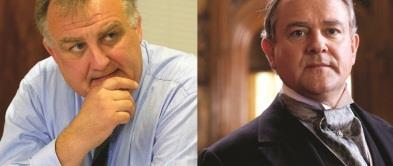An incoming Belgian is bringing his calming influence to Oxford and why a recent episode of Downton Abbey is the best one yet
End Game is looking forward to welcoming Bruno Holthof to the NHS - he’s about to take over Oxford University Hospitals Trust from Sir Jonathan Michael.
Dr Holthof arrives from Antwerp, where he currently runs a hospital chain. When Oxfordshire Clinical Commissioning Group staff went to visit him in Belgium recently, they found reasons to be encouraged.

Mr Holthof has already undertaken hospital reconfigurations, including closing down sites and turning a general hospital into one focused on specialist care. Jolly good, perhaps he will be the man to grasp the nettle in the prime minister’s backyard.
Commissioners were also impressed to see an organisation with zero delayed transfers and no waiting lists. How had the nattily bespectacled chief executive managed it? “Consultants were paid by treatment and procedure, and a patient non-attendance meant no payment,” the commissioners’ report said.
Cripes! We wonder what Dr Holthof will make of doctor/paymaster relations in the NHS. The report went on: “The overall atmosphere was very calm and organised.”
We bet it was. Like a school would be calm and organised if all the teachers were armed.
Caught on camera
The prospect of Clare Gerada shooing an inspector away from her Vauxhall GP practice, then being handed a fine - hopefully caught on camera - would be enough to make us grateful to have the Care Quality Commission inspection regime.
This scene came one step closer to reality when the former Royal College of GPs chair tweeted this (since deleted) question to the CQC: “What would happen if CEs of FTs refused to engage in @CareQualityComm visits? Just asking as CQC seem to tell them what they already know.”
The regulator replied: “Hi Clare, obstructing entry/inspection can result in a £2,500 fine,” with a link to its website.
But Dr Gerada was undeterred, telling @CareQualityComm: “But cost of preparing for inspection must run into hundreds of times more. Problem is you are only finding what is already known.” At the time of writing, the CQC had retired to its corner before the next round.
LOOKEY LIKEY

The great fortress foundation trusts are a bit like early 20th century British aristocracy: the historical locus of power, headed by mighty grandees but increasingly undermined by the costs of running their extensive estates, and facing an alternative power bloc rising from the grassroots.
Two factors helped End Game reach this realisation. The first was the above picture of Mark Hackett, lord of the manor at University Hospitals of North Midlands Trust, in which he resembles Hugh Bonneville, best known as Lord Grantham in Downton Abbey.
Just as surely as the end of summer spells a downturn in acute sector performance, Downton lumbers through yet another series - the difference being that while the NHS is grappling with an ageing population, the cast of Downton are eerily untouched by the decades that pass in the script.
To our delight, the latest series opened with a discussion of hospital reconfiguration. The big one up the road wants to take over the little one beloved of the dowager.
There was a lip-pursing meeting, shot through with silence and barely concealed resentment; some unevidenced talk about the benefits of working at scale; a good deal of local enmity; and two bloated egos pretending that what works for them is also in the best interests of patients.
Although Downton has been criticised as frivolous and improbable, they absolutely nailed this episode.
People, not structures
End Game attended a Westminster Health Forum event recently, chaired by Norman “Chingford Strangler” Tebbit, who was in mischievous form.
Inviting Dame Julie Mellor to speak, he introduced her as the “ombudsperson”.
‘We can’t have an ombudsman these days, can we?’
“We can’t have an ombudsman these days, can we?” he quipped.
Lord Tebbit then exhorted the NHS to concentrate on “people” as well as “structures”. “Good people will make a bad structure work reasonably,” he urged.
Counselling against an obsession with structure? It’s a pity he couldn’t have put that in a memo to the private secretary who once worked under him: Andrew Lansley.


























No comments yet